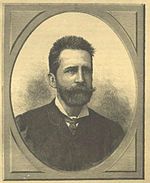Count Ladislaus von Szögyény-Marich
| Count László Szőgyény-Marich de Magyar-Szőgyén et Szolgaegyháza | |
|---|---|
 |
|
| Second Section Chief in the Imperial Foreign Ministry | |
|
In office 15 June 1882 – 2 May 1883 |
|
| Preceded by | Ladislaus Graf von Hoyos-Sprinzenstein |
| Succeeded by | Marius Freiherr Pasetti-Angeli von Friedenburg |
| First Section Chief in the Imperial Foreign Ministry | |
|
In office 2 May 1883 – 24 December 1890 |
|
| Preceded by | Ladislaus Graf von Hoyos-Sprinzenstein |
| Succeeded by | Marius Freiherr Pasetti-Angeli von Friedenburg |
| Minister besides the King of Hungary | |
|
In office 24 December 1890 – 24 October 1892 |
|
| Preceded by | Béla Baron Orczy de Orczi |
| Succeeded by | Géza Baron Fejérváry de Komlós-Keresztes |
| Austro-Hungarian Ambassador to Germany | |
|
In office 24 October 1892 – 4 August 1914 |
|
| Preceded by | Emmerich Graf Széchényi von Sárvár und Felsövidék |
| Succeeded by | Gottfried Prinz zu Hohenlohe-Waldenburg-Schillingfürst, Ratibor und Corvey |
| Personal details | |
| Born |
12 November 1841 Vienna, Austria-Hungary (now Austria) |
| Died | 11 June 1916 (aged 74) Csór, Austria-Hungary (now Hungary) |
| Nationality | Hungarian |
| Spouse(s) | Irma von Geramb |
| Children | Zsigmond Kamilla Mária Ilona |
| Parents |
László Szőgyény-Marich Sr. Mária Marich de Szolgaegyháza |
Count László Szőgyény-Marich de Magyar-Szőgyén et Szolgaegyháza (German: Ladislaus Freiherr (from 1910, Graf) von Szögyény-Marich von Magyar-Szögyén und Szolgaegyháza) (12 November 1841 – 11 June 1916), was an Austro-Hungarian diplomat of Hungarian origin who was a long serving Ambassador at Berlin.
Born in Vienna on 12 November 1841 into an old Hungarian noble family as son of László, a former judex curiae (chief justice) of Hungary.
After studies in Vienna, Baron Szőgyény-Marich entered the civil service and was elected to the Hungarian parliament in 1869 where he represented the Deák Party, then the Liberal Party. In 1883, he left the parliament to enter the Foreign Ministry of Austria-Hungary as Second Section Chief and was later promoted to First Section Chief. On 24 December 1890, he was appointed to serve as Minister besides the King of Hungary and was made a member of the Upper House.
On 24 October 1892, Emperor Franz Joseph I appointed him ambassador to Germany and he presented his credentials to the Kaiser at Berlin on 12 November. He would hold on to this position for twenty-two years, an extraordinarily long tenure even by the standards of the time. He owed his position due to his close connections, in particular Franz Joseph's protection – he had been a close confidant and friend of Crown Prince Rudolf and dealt with the latter's papers following the Mayerling incident –, and not even Count Lexa von Aehrenthal could have him replaced.
Considered shrewd and calculating but also unimaginative, he was a personal friend of the Kaiser and the most senior Habsburg ambassador. On 17 April 1910, he was elevated to the rank of a Count.
...
Wikipedia
